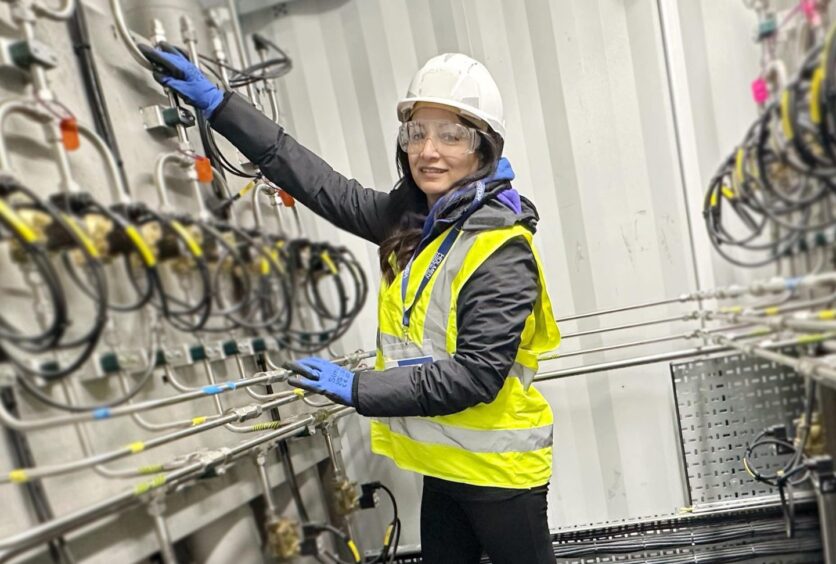
CCU International co-founder and chief executive Beena Sharma has taken part in a study led by Equity Energies to investigate what we know – or don’t know – about the UK’s plan to achieve net zero.
In an exclusive excerpt from the report, Sharma, who also co-founded Energy Voice’s Women in New Energy initiative, makes her own “carbon admission” around understanding the complexities of the net zero challenge, and discusses how her background training in psychology helps in challenging assumptions around what solutions and technologies are most relevant in the energy transition.
What is your carbon admission?
There was a tipping point when I had the realisation of what net zero actually means for businesses. So many people think they know what net zero is; I was guilty of that too. But when you really go back to basics and understand the fundamental goal, and hat it will take to achieve it, it is an eye-opening moment.
Net zero is a highly complex challenge – one unlike any other we face. It is extremely difficult, and I think because of that people are often hampered by firstly not truly understanding what it means, but then being lulled into a false sense of confidence by misinformation, or by the oversimplification of the problem.
I can’t tell you the number of times I’ve been part of conversations with people who believe themselves to be experts, who want to talk at a high level, but who, when pressed, cannot articulate the very basics of what net zero needs to be.
What’s most interesting to me is the sense of relief that is evident when people are honest about the things they don’t know, and how much they welcome the opportunity to be educated.
How important is technology in achieving net zero?
I firmly believe it is technology that will give us the means to achieve net zero. While encouraging progress is being made already through things like renewable energy and reductions in consumption, we need new technologies to counter the harder parts of the process. Take a business transporting people and supplies to offshore rigs via helicopter. Unless you go by boat, or swim, there’s no low or no-carbon alternative. The solution will be to remove that carbon from the atmosphere instead.
While there’s no disputing that we need cost-effective carbon capture to meet net zero goals, we’re currently faced with other challenges; the entrenched idea of carbon storage, the legacy carbon capture technologies that use carcinogenic chemicals, the lack of understanding around carbon capture efficiencies, for example.
In reality we have an opportunity to create a circular carbon economy – because we need clean, safe CO2 to supply a wide range of industries – but getting people to understand this, and to break from what they think they know about carbon capture and storage, is unbelievably hard.
Your background is in psychology. How has that helped you to navigate challenges in the industry?
You don’t need to be a psychologist to know that part of human nature is to assume everybody else already knows everything, and that you’re alone in your ignorance. That’s why it’s so hard for any one of us to put up our hand and say we don’t know something.
Let’s not forget that across every industry sector, and even within energy itself, sustainability and net zero are still relatively new concepts. We don’t have all the answers, especially because so much of the solutions are still in development. Yet assumptions exist that it’s possible to know it all and even possess the definitive solution, even when there’s no silver bullet, and there never will be.
I spend a lot of my time speaking at events, on panels, and with individual organisations, and I’ve found the thing that really cuts through is when I go back to basics on net zero. Giving people their own “lightbulb moment” of understanding is quite visibly disarming, even when they may well possess expertise in and around the energy transition or are entrenched in their beliefs about the right ways forward.
What’s your advice to organisations starting on their net zero journey?
Go back to basics yourself; make sure you truly understand what net zero means. This might involve undertaking your own research, but also talk to people, build your network, find sources of information that you trust. It’s always helpful to look to others who are making progress and who do understand the basic and the complex. That way you can benefit from their lived experience and access their knowledge.
How can we change the message to keep pace with new technology and new thinking?
One of the many challenges is the evolution of our approach. What may have been the correct answer today, might need to change tomorrow. It’s what we’re seeing with the antiquated approach to carbon capture and storage. Yesterday’s wisdom was that capturing CO2 and putting it back into the ground was the right model, just as we used to think sending all our waste to landfill was acceptable. But we need to evolve that view, even if that means stepping back from old systems and models to embrace a better way.
Early wisdom was that carbon offsetting was the key, and it helped that it was easy; purchase carbon credits to plant trees in a forest on the other side of the world and all your sins are forgiven. It’s one of the reasons why there’s so much confusion about Net Zero. But now we’re seeing the flaws in this as a fix-all solution, not least because of the lack of transparency in this model.
Don’t get me wrong, offsetting will be part of the mix – it has to be. But we should be focused on the 90% carbon reduction target first, and reserve offsetting for later down the line when there’s no other alternative.
Equity Energies is part of FTSE 100 listed DCC plc (LON:DCC).
Recommended for you
